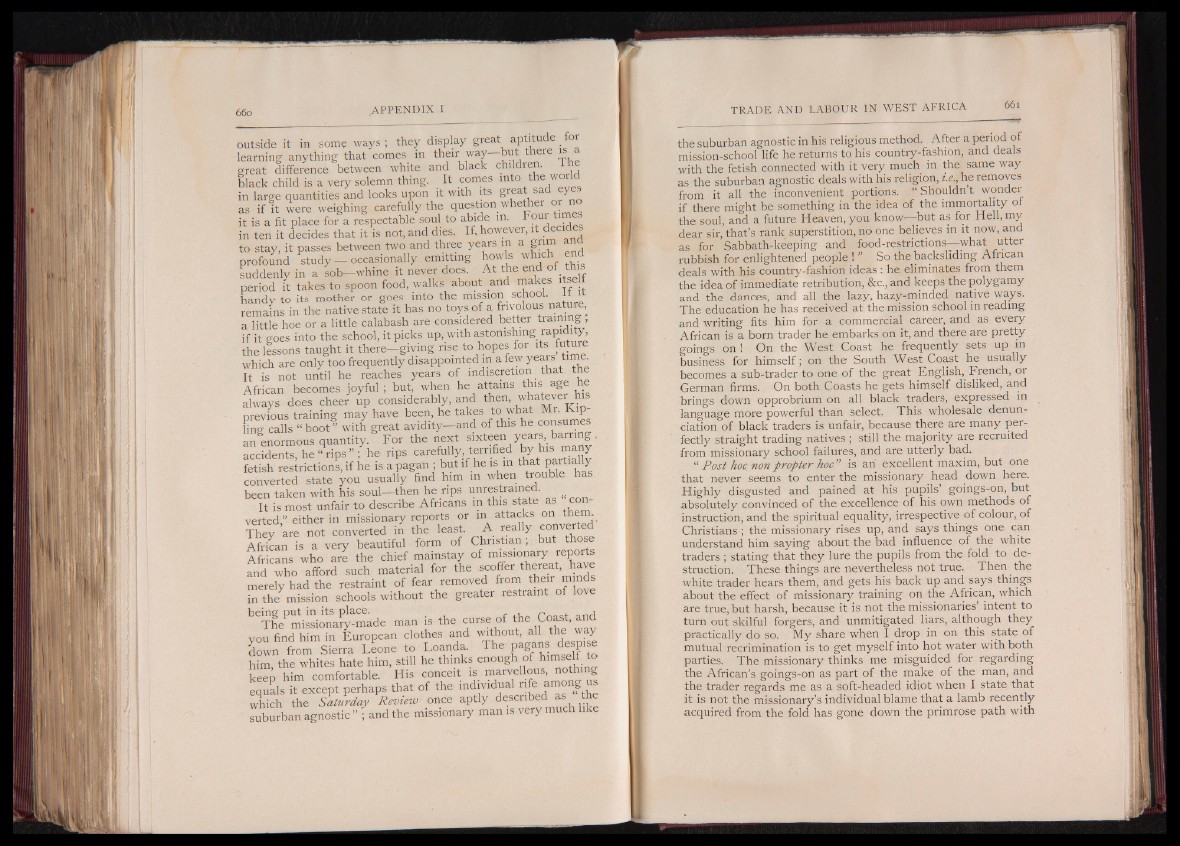
outside it in some ways ; they display great aptituc
learning anything that comes in their way— but there is
great difference between white and black children. Ihe
black child is a very solemn thing. It comes mto the world
in large quantities and looks upon it with its grea sa y
as if it were weighing carefully the q u e s t i o n whether or no
it is a fit place for a respectable soul to abide in. W W P
in ten it decides that it is not, and dies. It, however, it dead
to stay, it passes between two and three years in a gri
profound study — occasionally emitting howls which en
suddenly in a sob— whine it never does. A t the end oi t
period it takes to spoon food, walks about and M «
handy to its mother or goes into the mission school.
remains in the native state it has no f e
a little hoe or a little calabash are considered better training %
if it goes into the school, it picks up, with astonishing rapidity,
the lessons taught it there— giving rise to hopes for its future
which are only too frequently disappointed m a few years * .
It is not until he reaches years of indiscretion that the
African becomes joyful ; but, when he attains this age he
always does cheer up considerably, and then, whatevcr his
previous training may have been, he takes to what Mr. Kip
ling calls “ b oot” with great avidity— and of this he consumes
an enormous quantity. For the next sixteen years, barring .
accidents, he “ rips” ; he rips carefully terrified by his many
fetish restrictions, if he is a pagan ; but if he is m
converted state you usually find him m when trouble has.
been taken with his soul— then he rips unrestrained. v-
It is most unfair to describe Africans m this state as '
verted,” either in missionary reports or m attacks on therm
They are not converted in the least. A really converted
African is a very beautiful form of Christian, but those
Africans who are the chief mainstay of missionary reports
and who afford such material for the scoffer thereat, hav
merely had the restraint of fear removed from their minds
in the mission schools without the greater restraint of love
beT L Pmissionary-made man is the curse of the^ Coast, and
you find him in European clothes and without, all the way
down from Sierra Leone to Loanda. The pagans despise
him, the whites hate him, still he thinks enough of hl™self ^
keep him comfortable. His conceit is marvellous, nothing
equals it except perhaps that of the individual nfe among us
which the Saturday Review once aptly described as ^ the
suburban agnostic ” ; and the missionary man is very much
the suburban agnostic in his religious method. After a penod of
mission-school life he returns to his country-fashion, and deals
with the fetish connected with it very much in the same way
as the suburban agnostic deals with his religion, i.e., he removes
from it all the inconvenient portions. “ Shouldn’t wonder
if there might be something in the idea of the immortality of
the soul, and a future Heaven, you know— but as for Hell, my
dear sir, that’s rank superstition, no one believes in it now, and
as for Sabbath-keeping and food-restrictions— what utter
rubbish for enlightened people ! ” So the backsliding African
deals with his country-fashion ideas: he eliminates from them
the idea o f immediate retribution, &c., and keeps the polygamy
and the dances, and all the lazy, hazy-minded native ways.
The education he has received at the mission school in reading
and writing fits him for a commercial career, and as every
African is a born trader he embarks on it, and there are pretty
goings on ! On the West Coast he frequently sets up in
business for himself; on the South West Coast he usually
becomes a sub-trader to one of the great English, French, or
German firms. On both Coasts he gets himself disliked, and
brings down opprobrium on all black traders, expressed in
language more powerful than select. This wholesale denunciation
o f black traders is unfair, because there are many perfectly
straight trading natives; still the majority are recruited
from missionary school failures, and are utterly bad.
“ Post hoc non propter hoc” is an excellent maxim, but one
that never seems to enter the missionary head down here.
Highly disgusted and pained at his pupils goings-on, but
absolutely convinced of the excellence of his own methods of
instruction, and the spiritual equality, irrespective of colour, of
Christians ; the missionary rises up, and says things one can
understand him saying about the bad influence o f the white
traders ; stating that they lure the pupils from the fold to destruction.
These things are nevertheless not true. Then the
white trader hears them, and gets his back up and says things
about the effect of missionary training on the African, which
are true, but harsh, because it is not the missionaries’ intent to
turn out skilful forgers, and unmitigated liars, although they
practically do so. My share when I drop in on this state of
mutual recrimination is to get myself into hot water with both
parties. The missionary thinks me misguided for regarding
the African’s goings-on as part of the make of the man, and
the trader regards me as a soft-headed idiot when I state that
it is not the missionary’s individual blame that a lamb recently
acquired from the fold has gone down the primrose path with